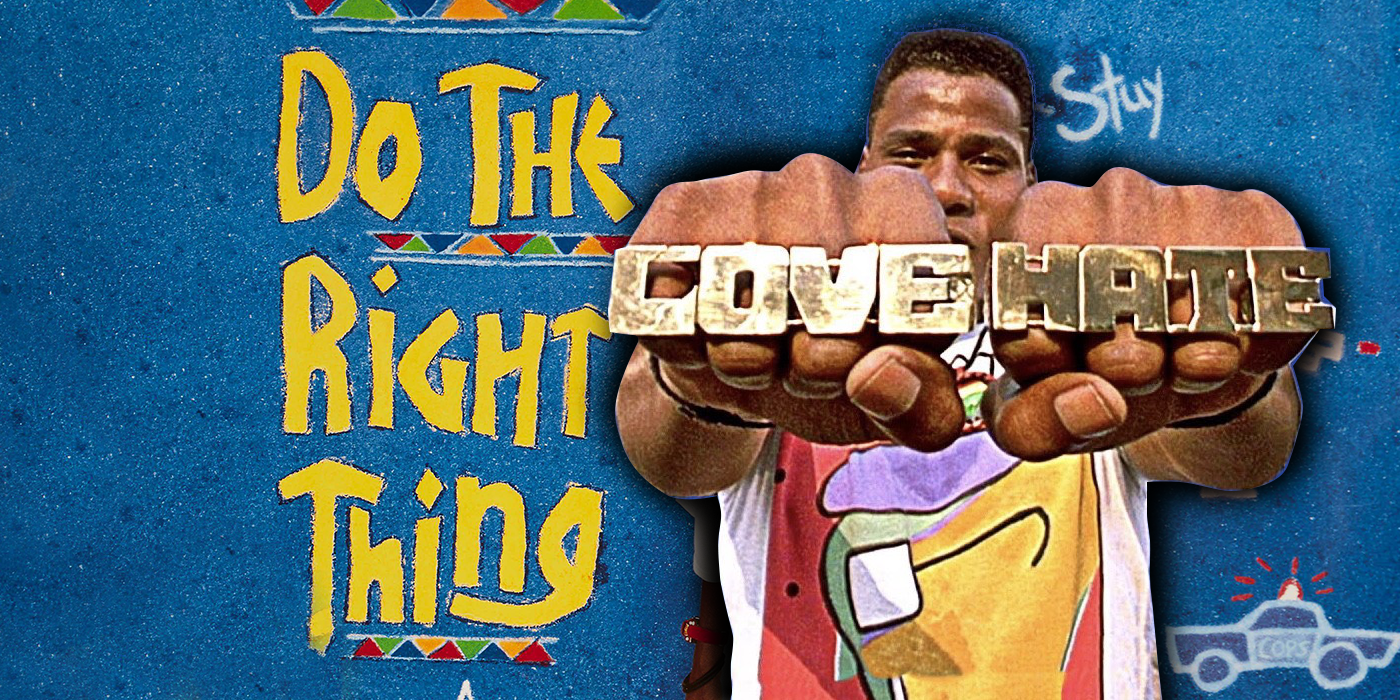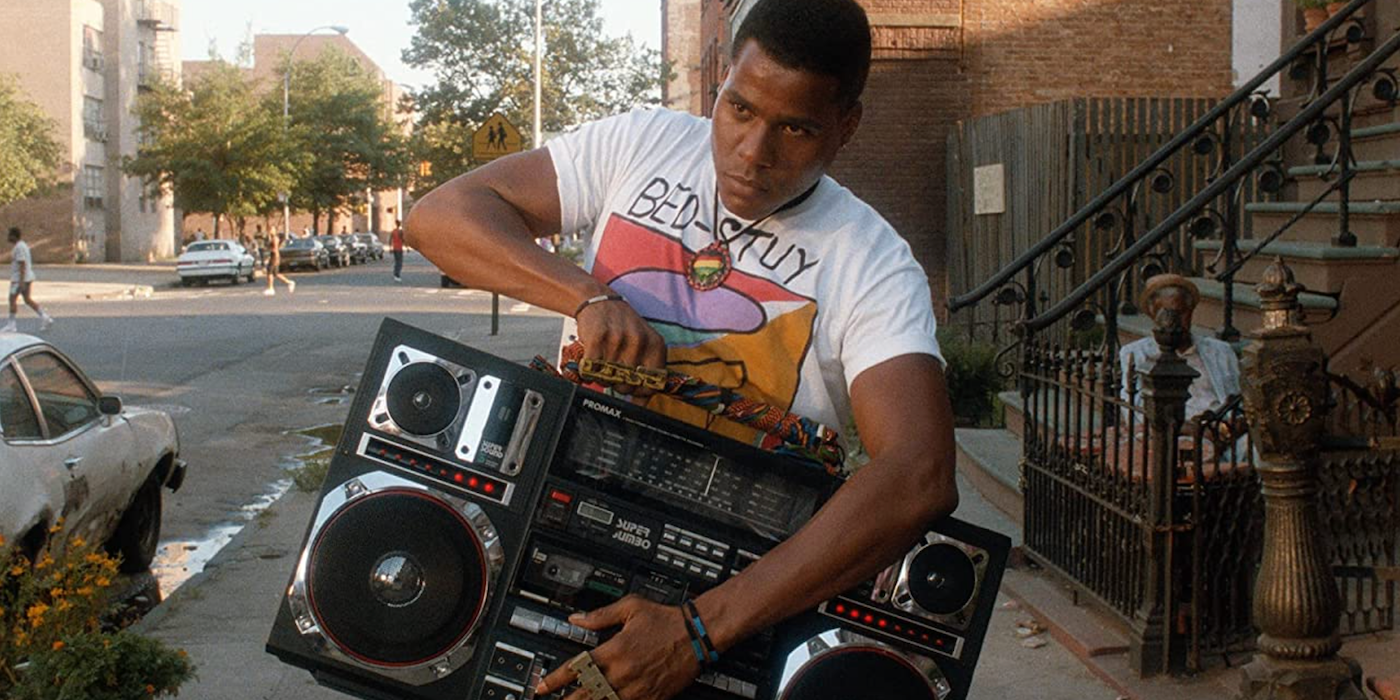Meeting Radio Raheem feels like a rite of passage. A central figure in Spike Lee's 1989 Oscar-nominated feature Do The Right Thing, Radio Raheem (played by the late Bill Nunn) is an unforgettable presence. As he walks around his neighborhood block in the Bed-Stuy corner of Brooklyn, Radio Raheem makes himself known by blasting his theme song — and the movie's theme song — "Fight the Power" by Public Enemy. Radio Raheem is a community presence like no other, one who never relents in sharing his message. I was recently able to reconnect with Radio Raheem thanks to the re-release of Do the Right Thing on 4K Ultra HD and Blu-ray. In my reconnection with Lee's seminal work, Radio Raheem's arc stuck with me. His boom box, his piercing stare, his use "Fight the Power" to do the speaking so he could save his breath, his death, and his gospel of "love versus hate." Every bit of Radio Raheem, from who he is to what he stands for, is something we still need today.
It had been several years since I'd last watched Do the Right Thing (my first viewing of it, too) and it's simply incredible what time can do to one's understanding of this story. I'm a white person, which means that throughout my life I've benefitted from the privilege of being able to pick and choose when I address racism and systemic racism, in particular. Do the Right Thing is a notable example of a movie that refuses to let its white viewers simply watch; they must absorb, understand, and digest what they're seeing. The events that transpire across Do the Right Thing's two-hour runtime are a condensed version of events happening in real-time right now, and in 1989, and stretching back to the earliest days of this nation. Rewatching Do the Right Thing now — after a year marked by the series of nationwide Black Lives Matter protests sparked by the respective murders of George Floyd, Breonna Taylor, and Ahmaud Arbery — means being asked as a white person to drop your privilege and confront the fact that racism still pervades, anti-Blackness still pervades, hatred still pervades.
And because the same systemic racism pervades, we still need to remember Radio Raheem and his message of love versus hate (as well as fighting the power). What Radio Raheem has to tell us about these two supreme forces forms the foundation of Do the Right Thing's moral struggle to decide whether it is right to embrace love or hate as a form of fighting back. Do we smother our enemy with understanding and empathy so that it overwhelms them at a core level and they are compelled to love us back because that is the only thing left? Or do we break our enemy down with the ferocity of hate, which drowns out anything lesser and frightens our enemy into meeting our demands? (This struggle is also illustrated through repeated references to Dr. Martin Luther King, Jr. and Malcolm X, two civil rights leaders who advocated different approaches to achieving the same goal. Granted, this puts them neatly into two boxes when really there was nuance to what they preached, but Do the Right Thing chooses to put them on opposite sites, ideologically, and look for nuance elsewhere in an effort to make its point.)
Radio Raheem gets to speak his piece about love vs. hate early in Do the Right Thing. As we follow Mookie (Lee) on a pizza delivery, he happens to cross paths with Radio Raheem, who is on the way to Mookie's workplace, Sal's Pizzeria, to grab a slice. As the two men prepare to part, Mookie notices Radio Raheem's "Love" and "Hate" rings. With a masterful bit of camerawork, our point-of-view swings around from third-person to second-person and regard Radio Raheem through Mookie's eyes. Radio Raheem then tells us about the story of Right Hand vs. Left Hand, love vs. hate:
"Let me tell you the story of Right Hand, Left Hand. It's a tale of good and evil. Hate: It was with this hand that Cain iced his brother. Love: These five fingers, they go straight to the soul of man. The right hand: The hand of love. The story of life is this: Static. One hand is always fighting the other hand, and the left hand is kicking much ass. I mean, it looks like the right hand, Love, is finished. But hold on, stop the presses, the right hand is coming back. Yeah, he got the left hand on the ropes, now, that's right. Yeah, ooh, it's a devastating right and Hate is hurt, he's down. Left-Hand Hate KOed by Love. If I love you, I love you. But if I hate you..."
It is fascinating to see how Do the Right Thing stops to take time to listen to Radio Raheem. As he shares the gospel of love and hate's eternal struggle against one another, he is calm, collected, assured. Hearing Radio Raheem's speech happens purely by chance (what if Mookie had taken a different delivery route? What if Radio Raheem had stopped elsewhere?). In that chance encounter, Mookie is offered a view of the world he may not have considered or had the luxury of time to stop and consider — but it's necessary he hears it now as tensions around him rise. We, too, are hearing it by chance which means we must also stop and seriously consider what Radio Raheem is telling us.
It is also worth pointing out here that "Love" is associated with the right hand, a side typically associated with the rule of law and justice, whereas "Hate" is associated with the left hand, a side existing outside of order and more harmfully chaotic. Just as Do the Right Thing makes sure we think of Radio Raheem's life — and circumstances around his death — every time we hear Chuck D rapping on "Fight the Power," placing the "Love" and "Hate" rings on these specific hands gives us a visual clue that Do the Right Thing wants us to consider the effectiveness and ineffectiveness of the values each side stands for here. The movie may never fully come down on one side, but it does present these two radically powerful options as the only two options left to end the systemic racism which runs throughout our country.
Just as Do the Right Thing takes time to address the cyclical battle between love and hate, it takes time to show Radio Raheem's murder by two cops. The cycles are entwined together in Do the Right Thing, just as they are in real life. Love or hate can end the cycle of violence, yes, but the way in which each side ends it looks different. For Do the Right Thing, a kind of hate emerges. As Radio Raheem is suffocated by the cops, the neighborhood watches and demands he is let go. When the cops instead realize they killed Radio Raheem and shove his body into their car, it is understandable then that hate bursts forth first as the community comes together and destroys Sal's. There may be love among the members of this community as a new day dawns, but the heaviness of Radio Raheem's death sits with them, too.
Radio Raheem's murder is a scene we know well. It's a scene that happens 25 years before Eric Garner's murder, 31 years before Floyd's murder. Lee made a short film in 2020 (via Indiewire) linking the deaths of three men, "3 Brothers — Radio Raheem, Eric Garner, and George Floyd," because the circumstances are hauntingly identical. At the time, Lee introduced the short on Don Lemon's CNN show, stating,
"How can people not understand why people are acting the way they are? This is not new, we saw with the riots in the '60s, the assassination of Dr. King, every time something jumps off and we don’t get our justice, people are reacting they way they do to be heard. We are seeing this again and again and again. This is the thing: the killing of black bodies, that is what this country is built upon.
Radio Raheem sought respect, recognition, and to be treated fairly. He preached the power of love, its ability to beat back hate because of its strength, and went un-listened to; instead, he was met with life-ending violence. Radio Raheem was sucked into the cycle that churns on and on, fueled by the deaths of members of a community who allegedly have equal rights in theory but, in reality, are still subjected to systemic racism which prevents them from achieving that equality.
The great point here is this: This cycle of violence must end. It has always been necessary to end it and it is not the responsibility of Black Americans to end it. This is a cycle that bears a psychological, physical, and emotional impact on Black Americans. At nearly every juncture, when presented with the opportunity to not treat Black Americans as disposable citizens, the systems in place meant to support them have failed. Do the Right Thing's struggle to firmly advocate for love or hate echoes how that same struggle has played out in real life. But where Black public figures did the work to little long-lasting change (How often do we see a quote from Dr. King or Malcolm X thrown around with little care for its true meaning?), Do the Right Thing's message must be picked up by white Americans. Do the Right Thing was speaking to whites then and it still speaks to us now. Radio Raheem still speaks to us now, all these years later. To know Radio Raheem and to hear his message is a privilege and it should be treated with care as much as it should be treated as a call to action. And if you do answer his call, think carefully about whether you will choose love or hate.


